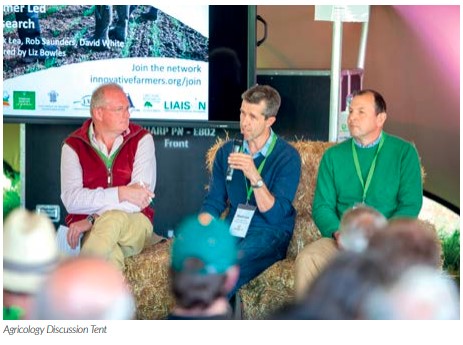Gabe Brown often quotes his friend Don Campbell’s aphorism: ‘If you want to make small changes, change the way you do things. If you want to make major changes, then change the way you see things.’ This nutty little saying encapsulates so much wisdom, but it is much easier said than done. We all have our own little prejudices or theories about how the world works, or more crucially about why we farm the way we do. It is surprisingly hard to stand back and look at our operations and really see what is going on and how it could change for the better.
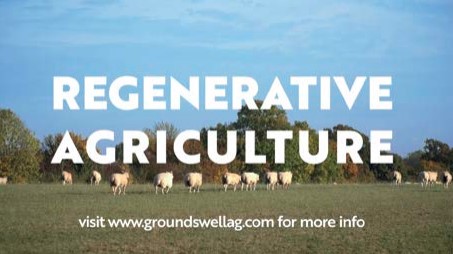
The great thing about the whole Regenerative Agriculture movement is that it is almost completely farmerled. There are plenty of suppliers who are now producing drills and other products which the pioneer farmers have created a demand for. There are also more than enough suppliers trying to jump on the bandwagon and flog us stuff that we don’t need. The habit of looking for solutions in bottles and bags seems to be ingrained in farmers, but, as readers of this publication will know, most of us need fewer inputs the longer we direct drill and we have resigned from the More-on club.
All that we need to do now on our farm, is ramp our yields up a bit, without ‘buying’ them and we’ll be even better off. Or…we could take advantage of some of the lessons that Lockdown has taught us and work at growing crops and other produce that local people want to buy and sell direct to them. Grow less and sell for more.
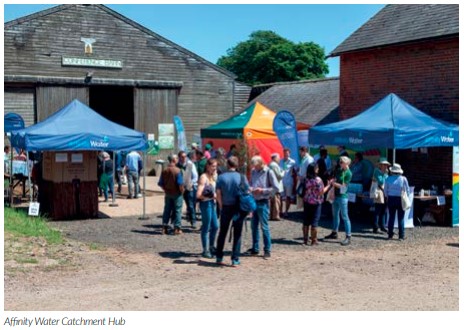
The trouble with trying to increase production is that we keep making mistakes, like ignoring the golden rule that no-tilled crops want to go in a fortnight earlier than with ‘conventional’ establishment in the autumn and a fortnight later in the spring. Last autumn we held off drilling oats until the wheat volunteers had chitted…and then it started raining. A bit like the year before. We eventually sowed them on a frost in mid February (it’s kind ground where they’ve gone) and it looks like we’ve got away with it, as the weather postdrilling has been kind to the seeds.
As I’m writing this, at the end of February, we’re drilling Mulika spring wheat into the remnants of a cover crop on more kind ground. The soil is in fantastic condition and the forecast is good, so the seed should be able to get away before any horrific rain event tries to drown it. Some of our later drilled winter wheats spent most of the winter looking a bit miserable with wet feet. Some patches we’ll end up having to redrill or over-drill with Mulika.
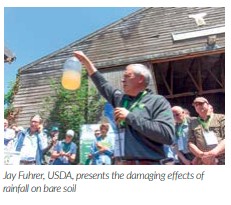
Time will tell if we will pay for this rule breaking, but we’ve had our fingers burnt too often by waiting until late March or April for spring sowing, this is too often followed by a long cold dry spell, which sets the crop off to a rotten start and ends with disappointing yields. The trouble with this being a farmer-led revolution is that farmers are the only ones doing meaningful trial work on this. Some of our trials, if we’re being honest, are just a polite way of describing mistakes.
We’ve had a lot of feedback from attendees at the Groundswell Show saying that they want to change their system but don’t know how to set about it, or that their agronomist/ father/husband or whoever tells them it won’t work on their land. So we’ve set up Groundswell Agronomy. It’s basically a dating agency: you get in touch with us, we’ll have a talk and then put you in touch with an agronomist who should be able to help you out. We’ve got a selection of wonderful and open-minded agronomists to put your way. It’s proving popular, we’ll be needing more soon so we don’t wear out the ones we’ve got.
As I often point out to people, we are, to an extent, making it up as we go along. We are not a demonstration farm exhibiting best practice, but we are still very excited about the potential we have, as farmers, of growing good food to sell, at the same time as improving our soils, the local environment and our bank balance. This enthusiasm for different ways of doing things is why we started the Groundswell Show.
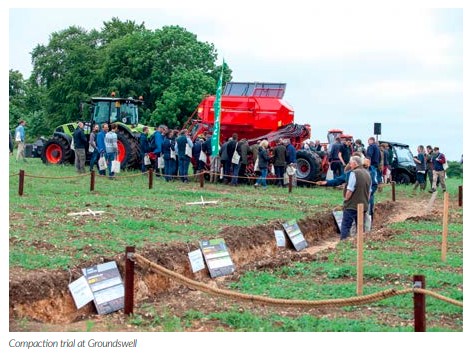
We’ve been very relieved to hear the Government saying that by the end of June lockdown should be properly over. Which means we’re going fullsteam ahead with organising this year’s Show (23/24th June 2021), We’ve shifted the site to a nearby field and all the talks etc will be in tents rather than barns, which means we should be able to ventilate and socially distance if needed. As usual, it’ll be a nightmare trying to juggle which talks to attend. We’ve had so many interesting ideas for subjects to discuss put to us, that we don’t want to turn any of them away. It is such an exciting time to be a farmer.
At the moment it still looks doubtful that we can fly many, or indeed any, high-profile speakers in from abroad, but it may work well as we can put on many more homegrown speakers who are all doing fascinating things around the UK. See box for some details. We’ll have a new trial plot for the direct drills to work in, with plenty of space and more exhibitors bringing more ideas in. For those who fancy a walk, there’s an agroforestry experiment nearby, coupled with a no-input heritage wheat with clover understory experiment as well as the mob-grazing demo.
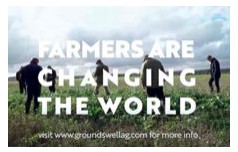
We’re not sure exactly how many people we can host each day, we’ll start selling tickets when we know… it won’t quite be like Glastonbury so you won’t have to go online at midnight, but it does sound like we’ll sell out pretty quick, so don’t hang about if you want to secure a place.
